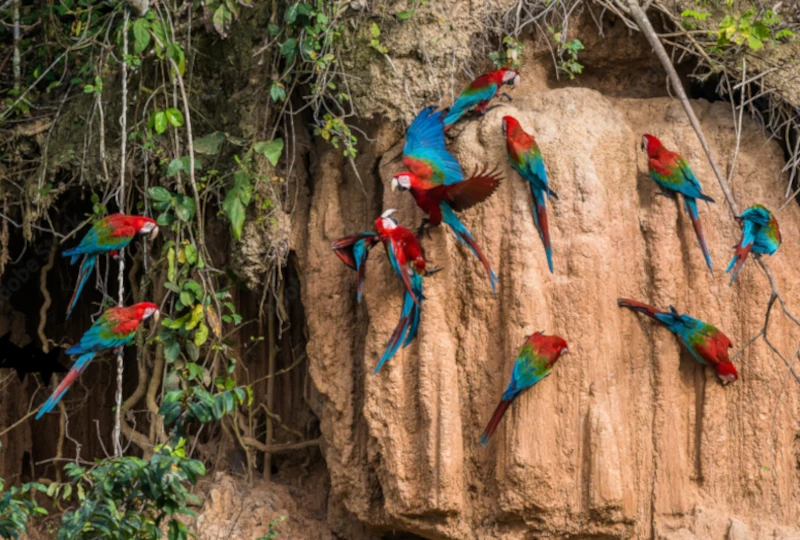Macaws in the wild mainly eat fruits, nuts, and seeds. These colorful birds come from Central and South America. They eat many different natural foods. We will look at how macaw food helps them stay healthy and live longer.
This guide will help you understand macaw nutrition, whether you are a traveler, photographer, or researcher.
Macaws belong to the parrot family and display brilliant colors, large beaks, and social behavior. In the wild, their diet is as vibrant as their plumage. Macaws eat fruits, nuts, and seeds as their main diet, and they sometimes eat flowers, leaves, and small insects. This variety ensures they receive a balanced intake of nutrients necessary for their survival.

Fruits: A Staple in the Macaw Diet
The Amazon rainforests, where macaws flourish, are abundant with fruits year-round. Macaws have a penchant for fleshy fruits, which are rich in vitamins and minerals. They particularly favor fruits like mangoes, bananas, and papayas. These fruits are not just delicious but also provide essential nutrients that support their vibrant feathers and overall health.
Fruits are crucial for hydration as well, especially during the dry season when water sources might be scarce. The high water content in fruits like oranges and grapes keeps macaws hydrated.
Nuts: Nature’s Energy Bars
Nuts are another vital component of a macaw’s diet. Known for their high-fat content, nuts offer the energy needed for these active birds. Macaws use their strong beaks to crack open even the toughest nuts, like Brazil nuts and almonds.
These nuts are full of protein and fat, giving birds extra energy, especially during breeding.
Seeds: A Powerhouse of Nutrients
Seeds are a macaw’s go-to snack, providing a variety of nutrients that contribute to their health. Seeds from plants like sunflowers and palms are popular among macaws. These seeds offer essential fatty acids and proteins that aid in feather and skin health.
In the wild, macaws pick fully ripe seeds to get the most nutrition.
Understanding the Nutritional Needs of Macaws
Macaws have specific nutritional needs that are met through their diverse diet in the wild. Their diet is high in natural sugars, fibers, and fats, which support their high energy levels and active lifestyle. When feeding macaws or studying their habits, it is important to mimic this diet balance closely.
Balancing the Diet
A balanced diet is essential for a macaw’s health, whether you care for them or study their eating habits. In captivity, providing a variety of fruits, nuts, and seeds similar to what they would find in the wild is crucial..
Importance of Variety
Variety is not just the spice of life for macaws; it’s a necessity. A mix of different fruits, nuts, and seeds ensures they receive a spectrum of nutrients. This variety also keeps their diet interesting and engaging, which is important for their mental well-being.
Conclusion: The Art of Feeding Macaws
Learning what macaws eat helps us understand how to care for them in the wild or as pets. They eat fruits, nuts, and seeds to stay healthy and full of energy.
By studying their habits, we can better understand nature’s balance and how it supports these amazing creatures.
Whether you want to see macaws in the wild or care for one as a pet, knowing their diet is key to keeping them healthy and happy.

